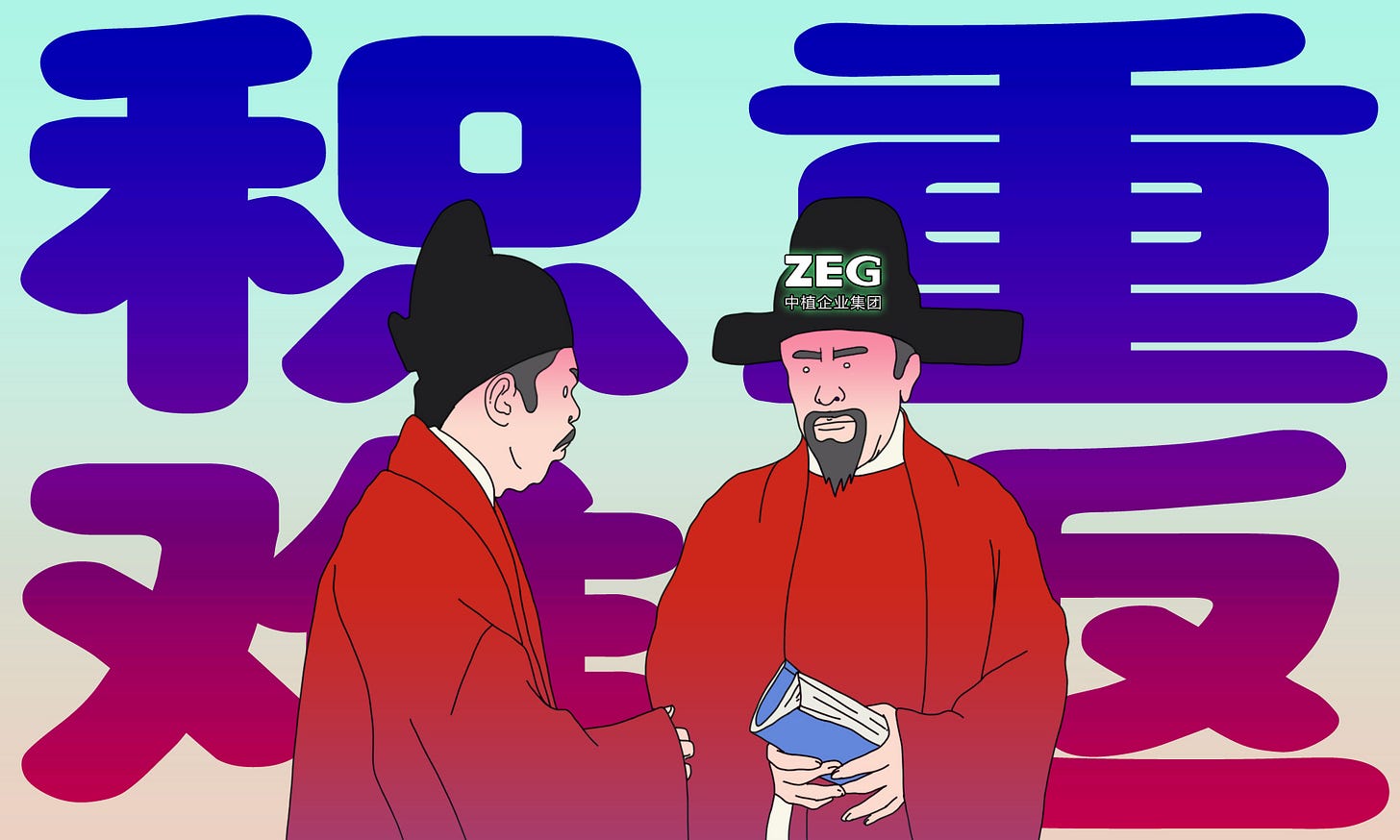Welcome to RealTime Mandarin—a multimedia resource to immerse you in the latest Chinese language trends, inspire you to practice and improve your Mandarin every week, and empower you to communicate with confidence.
Subscribe now to get the next issue straight to your inbox!
Zhongzhi Enterprise Group 中植企业集团 (ZEG), a huge financial business in China, has warned investors it’s unable to repay its debts.
On November 22, Zhongzhi issued an open letter to investors, apologising for a material breach of its products. It also disclosed the group's assets and liabilities for the first time, allowing the outside world to understand the scale of the crisis in the group.
11月22日,中植集团已经发布了一份致投资者的公开信,为产品发生实质性违约向投资者致歉。并且首次公布了集团的资产负债情况,让外界得以首次了解中植系的危机规模。
The Beijing-based wealth manager said its total liabilities were as high as 460 billion yuan (US$64.8 bn), while its total tangible assets stood at just 200 billion yuan (US$28.1 bn).
On 26 November, Beijing authorities announced investigations into “illegal activity” in the company, and since then two ZEG executives have been arrested.
The group is also known colloquially as 中植系 zhōng zhí xì. The character, 系 xì, at the end means a large “group”, “system” or “empire” of companies.
ZEG sells wealth management products (理财产品 lǐcái chǎnpǐn) to its well-off Chinese customers:
The investment threshold is relatively high, so most investors are wealthy people. A wealth manager in ZEG once revealed the company had 150,000 investors with a single investment of over 3 million yuan, with the highest investment amount of a single customer was over 5 billion yuan.
中植系的理财产品的投资门槛较高,所以投资者以有钱人居多。中植系旗下一位理财经理曾经透露,中植系投资产品单个300万元以上的投资人有15万,单个客户最大投资金额50多亿元。[1]
So its impending collapse means there will be many wealthy and powerful people in China who are out of pocket.
ZEG is described in the Chinese press as one of the country’s largest “privately run asset managers” (民营资产管理公司). In the international media it’s described as China’s biggest shadow banks. The Chinese term for “shadow bank” is 影子银行 yǐngzi yínháng, which is taken from the English.
Shadow banking is lending that takes place outside of conventional banks, done by financial intermediaries, like ZEG, not subject to the same levels of regulatory oversight as the traditional banking system.
In China shadow banking began in the 1990’s as entrepreneurs and businesses were in need of capital. It really took off after the financial crisis in 2008, and is now a $3 trillion market. Shadow banking in China now includes most kinds of wealth management products available in China not sold by the four major banks.
These wealth management products are traded on provincial level markets known as “financial asset trading platforms” (金融资产交易所, or 金交所). But these offer limited transparency to investors. The platforms are also closely linked with China’s troubled property markets, as billions of yuan have been poured through them into empty and unfinished tower blocks, known as “rotten end buildings” (烂尾楼 lànwěilóu), which we discussed two weeks ago.
ZEG wealth management products are mainly trusts (信托 xìntuō) and Private Placement Notes or PPN (定融 dìngróng). Both are typical shadow banking products in China, offering higher returns than standard products offered by the main banks.
According to wealth advisors who sell PPN products, the biggest feature is that the borrower and the lender trade directly, without a middleman making a margin, so it can provide a higher rate of return. [1]
按照那些推销定融产品的财富顾问们的说法,定融的最大特点就是资金借贷双方直接交易,没有中间商赚差价,所以能够提供较高的回报率。[1]
The problems at ZEG are complex, multi-layered and could be impossible to untangle, as one commentator notes:
After the death of the founder (in 2021), combined with sluggish economic growth, capital market shocks, and a downturn in the real estate market, Zhongzhi is hopeless as its old ways have created far too many problems. As the financial crisis in the domestic real estate industry deapens, so too is the financial pressure on Zhongzhi.
在失去创始掌舵人后,叠加经济增速放缓、资本市场震荡以及房地产市场低迷,中植过往多年的模式积重难返。随着国内房地产行业暴雷面积越来越大,让中植系的资金缺口压力也越来越大。[1]
So, that’s what we are exploring this week!
Favourite Five
1. 踩雷 cǎi léi
to step on a landmine; be a victim of financial scam
还想追求远超市场平均水平的回报率,踩雷几乎就成为大概率事件 - If investors still want to pursue returns far beyond the market average, getting into trouble is highly probable. [1]
Related:
暴雷 bào léi - experience a financial crisis
被坑 bèi kēng - to be cheated
2. 人走茶凉 rén zǒu chá liáng
when the person leaves, the tea cools; the superficiality of human relationships
他还表示,中植的问题复杂,许多问题仰仗解直锟调解,很担心人走茶凉 - He also expressed the concern that many issues will remain unresolved after Xie Zhikun's death, as tackling those complex issues at Zhongzhi often relies on Xie's mediation (which relies on his relationships with the stakeholders). [3]
3. 积重难返 jī zhòng nán fǎn
cumulative problems that are difficult to recover from
此外还有常年积累下来的坏账、内部贪腐和投资损失等,积重难返 - In addition, there are perennially accumulated bad debts, internal corruption, and investment losses, making the situation even more difficult to recover from. [3]
4. 拆东墙补西墙 chāi dōng qiáng bǔ xī qiáng
dismantle the eastern wall to fix the west wall; shift resources from one place to another
如果一个定融产品自身没有足够的造血能力,主要用于拆东墙补西墙,那么这种融资模式其实就成为庞氏骗局 - If a PPN product cannot generate profit and is primarily used to repay old debts, this financing model is essentially a Ponzi scheme. [1]
5. 山雨欲来风满楼 shān yǔ yù lái fēng mǎn lóu
the wind is rising and the rain is coming; signs of an impending crisis
最近这一连串的新闻,颇有种“山雨欲来风满楼”的气息 - The recent series of news gives off a sense of "the wind is rising and the rain is coming", signaling an impending crisis. [2]
More: From The Eastern Tower of Xianyang City 咸阳城东楼, a poem by Tang poet, Xu Hun 许浑. The full line is:
Clouds rise above the stream, the sun sinks behind the pavilion,
The mountain rains are soon to arrive, as the winds fill the tower.
溪云初起日沉阁,山雨欲来风满楼。
Consuming the Conversation
Useful words
6. 收割 shōu gē
to harvest, to reap profits
中植系是怎么做到专门收割富人,最终又走到了暴雷这一步呢 - How did Zhongzhi Group manage to harvest profits from the wealthy and ultimately get itself into financial trouble? [1]
7. 贪欲 tān yù
greed, desire for wealth
人性对于高收益的贪欲都一样,在这一点上,富人和穷人没有本质区别 - Human nature is the same when it comes to the greed for high returns; in this aspect, there is no fundamental difference between the rich and the poor. [1]
Related: 贪婪 tān lán - greed
8. 风波 fēng bō
storm, turmoil
预示着这个庞大商业帝国的未来要面临巨大的风波 - It foreshadows that the future of this vast business empire is about to face significant storms and turmoil. [2]
9. 系族 xì zú
family-owned enterprise or group
中植系是国内以资本运作为主的民营系族的代表之一 - The Zhongzhi Group is one of the typical family-owned private enterprises in China with a primary focus on capital management. [2]
Note: The group of companies, often referred to as an empire, can also be abbreviated as 系. For example, 中植系.
10. 庞杂 páng zá
complex, intricate
中植集团业务布局广泛,子公司庞杂 - The Zhongzhi Group has a wide-ranging business, with its complicated and diverse web of subsidiaries. [3]
11. 窟窿 kū long
hole; gap, debt
多年的正常兑付背后,中植的资产不良窟窿可能越来越大,越来越难以掩盖 - Behind years of regular payments, the problems in Zhongzhi's non-performing assets may be getting larger and increasingly difficult to conceal. [3]
Three-character phrases
12. 领头羊 lǐng tóu yáng
leader, front-runner
对于这家国内最大的民营资产管理公司,失去了领头羊,也就失去了带领公司走出困境的核心力量 - For this largest domestic private asset management company, losing the leader means losing the key figure that could lead the company out of the woods. [1]
Related:
掌门人 zhǎng mén rén - leader, head of an organisation
13. 大手笔 dà shǒu bǐ
bold move, large-scale action















